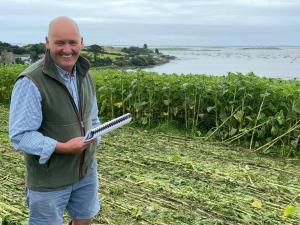Adrian McGowan from Millbank Farm, Killinchy is one of the first group of farmers to benefit from the Soil Nutrient Health Scheme (SNHS), having participated in the first Zone of the roll out of the programme in Northern Ireland.

Mr McGowan has over 45 years’ experience as a farmer on his 300-acre family farm which is now into its sixth generation with his daughter Emily successfully taking the business forward.
During a recent visit to their farm in Killinchy, overlooking Whiterock Bay and Strangford Lough, Mr McGowan explained why he thinks participation in the scheme is of great value to him and his farm.
When Mr McGowan was asked about his participation in the scheme he praised the benefits of the SNHS soil analysis and runoff risk reports he had received commenting that:
“We are managing a mixed farm ranging from poultry broilers, vegetables, cereals, cattle, sheep, and pigs and it is critical to know the nutrient status of my soil. The analysis reports have provided a precise line in the sand as to where we are currently.”
He added “The Soil Nutrient Health Scheme is raising consciousness of our waterways. The runoff maps I received were very accurate and precisely tracked. We, as farmers, don’t want to cause unnecessary loss of nutrients and it supports sustainability by not adding more fertiliser than is required. This also reduces costs as fertiliser is currently so expensive.”
This £37 million DAERA-funded project is being delivered by the Agri-Food and Biosciences Institute (AFBI) and is open to all Category 1 farm businesses in Northern Ireland, with a potential for up to 700,000 fields to be sampled by the end of the project in 2026. The aim of the four-year scheme is to improve sustainability and efficiency in the farming sector.
This year, Zone 2 of the scheme is inviting registrations from farm businesses across Fermanagh, the west of County Armagh and South Tyrone by the 31 August deadline. All farm businesses in the Zone 2 area are strongly encouraged to apply and benefit from all this free scheme offers. They will also be required to participate if they wish to receive future funding such as the new Farm Sustainability Payment (which will replace the Basic Payment Scheme).
Farmers just need to register their fields; all sampling and analysis will then be carried out for them by AFBI-appointed sub-contractors over the coming winter period. Farmers can register through their Government Gateway accounts online, by contacting their agricultural agent or by making an appointment at their local DAERA office. Farm businesses are being urged to take the first available opportunity to register and not leave it until the last minute.
Dr Rachel Cassidy, Scientific Lead at AFBI commented:
“The Soil Nutrient Health Scheme will provide farmers with important information on soil nutrient and pH levels for each field on their farm. Farmers will also receive maps showing areas at high risk of runoff and nutrient loss to watercourses and a first baseline estimate of the amount of carbon stored in their soils, hedgerows and trees.
This information will help them more accurately match nutrient applications to crop needs, thereby increasing efficiency while also reducing the farm’s environmental footprint.”
To date over 6,000 farmers in Zone 1 have received soil analysis results and runoff risk maps for their farms, including pH, phosphorus, potassium, magnesium, calcium and sulphur, together with crop specific lime and fertiliser recommendations. Farmers can view all their results and farm maps online through the Government Gateway portal.
For more information visit https://bit.ly/SNHS_NI
A video clip featuring Adrian McGowan filmed at Millbank Farm can be viewed at https://bit.ly/AdrianMcGowan-MillbankFarm
T: 028 90255212 E: snhs@afbini.gov.uk
Notes to editors:
AFBI’s Vision is “Scientific excellence delivering impactful and sustainable outcomes for society, economy and the natural environments".
AFBI’s Purpose is “To deliver trusted, independent research, statutory and surveillance science and expert advice that addresses local and global challenges, informs government policy and industry decision making, and underpins a sustainable agri-food industry and the natural and marine environments”.
AFBI’s core areas:
- Leading improvements in the agri-food industry to enhance its sustainability.
- Protecting animal, plant and human health.
- Enhancing the natural and marine environment.
Latest news
- AFBI issues Nematodirus warning – Spring 2025 11 April 2025
- Managing Nature Based Risks to the UK Economy and Opportunities for Green Finance 08 April 2025
- AFBI Hillsborough host AERA committee 27 March 2025
- The Omics Days Conference 27 March 2025
